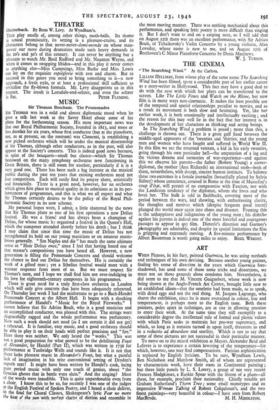MUSIC
Sir Thomas Beecham. The Promenades
SIR THOMAS was in a mild and almost diplomatic mood when he gave a talk last week at the Savoy Hotel about some of his plans for the forthcoming season. His most important news was that our Royal Philharmonic Society, founded in 1813, and more or less derelict for six years, whose first conductor (but at the pianoforte, not, as at present, on the rostrum) was Clementi, is establishing a new picked orchestra which will be under the musical directorship of Sir Thomas, although other conductors, as in the past, will also appear at the Society's concerts. This is indeed good news because, in spite of the bouquets—small but choice—which Sir Thomas bestowed on the many symphony orchestras now functioning in Great Britain, there is still room for another, particularly if it is a very good one. There has been such a big increase in the musical public during the past ten years that existing orchestras need not fear competition. Each will easily find its proper share, artistically and financially. There is a great need, however, for an orchestra which gives first place to musical quality in its selections as in its per- formances of programmes, and this is what we all expect and what Sir Thomas certainly desires to be the policy of the Royal Phil- harmonic Society in its new scheme.
My personal hopes were, I admit. a little shattered by the news that Sir Thomas plans as one of his first operations a new Delius festival. He was a friend and has always been a champion of Delius, for whose music h.! organised a festival in the Queen's Hall, which the composer attended shortly before his death ; but I think I may claim that since that time the music of Delius has not strengthened its hold on our young musicians or on amateur music- lovers generally. " See Naples and die " has much the same ultimate sense as " Hear Delius once," since I feel that having heard one of that master's compositions you have heard all. However, a new generation is filling the Promenade Concerts and should welcome the chance to find out Delius for themselves. His is certainly the work of a gifted man ; yet a Sibelius festival would meet with a warmer response from most of us. But we must respect Sir Thomas's taste, and I hope we shall find him not over-indulging in his love for eighteenth-century composers in his programmes.
There is great need for a truly first-class orchestra in London which will only give concerts that have been adequately rehearsed. On Thursday last week I had the misfortune to go to a Bach-Handel Promenade Concert at the Albert Hall. It began with a shocking performance of Handel's "Music for the Royal Fireworks." I cannot believe that Sir Adrian Boult, who is a good musician and an accomplished conductor, was pleased with this. The strings were disgracefully ragged and the whole performance was perfunctory. Now such a work should not need (as I am certain it did not get) a rehearsal. It is familiar, easy music, and a good orchestra should be able to play it on their heads with perfect precision and " fire." Here there was neither. We only heard the " works." This was not a good preparation for what proved to be the debilitating Feast of Alexander, by Handel (Part II), which was written in 1736 for performance at Tunbridge Wells and sounds like it. It is not that there lacks pleasant music in Alexander's Feast, but what a painful lack of imagination in his trite conventional setting of Dryden's superb text! It might have been written by Handel's cook, being pure period music with only one touch of genius, about " the Grecian ghosts that in battle were slain." And the singing? Most of the words were inaudible. This is quite unpardonable even from a choir. I know this to be so, for recently I was one of the judges at the English Festival of Spoken Poetry, and I heard a choir deliver, in the final for Choral Classes, Shakespeare's lyric Fear no more the heat o' the sun with nerfect clarity of diction and ensemble in the most moving manner. There was nothing mechanical about this performance, and speaking lyric poetry is more difficult than singing it. But I don't want to end on a carping note, so I will add that on August tzth there was an excellent performance, with Sir Adrian Boult, of Tchaikovsky's Violin Concerto by a young violinist, Alan Loveday, whose name is new to me, and on August 17th of Beethoven's C Minor Pianoforte Concerto by Denis Matthews.
W. J. TURNER.


























 Previous page
Previous page